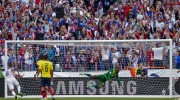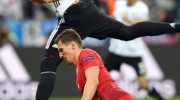Under Platini, the Euro has been expanded. Eight teams played a total of 15 games in 1992. Four years later, 16 teams played 31 matches. This year, 24 national squads will play a total of 51 games.
France has used the tournament as an opportunity to build four new stadiums and refurbish five others, meaning the whole of the country’s soccer infrastructure has been updated. Of the 10 stadiums that will host games this tournament, only Stade de France, in St. Denis north of Paris, is not new or overhauled.
France needed this because even though it is still producing good players, its top domestic league has fallen behind other top leagues in Europe. Its finest talent migrates abroad to play professionally, notably for the greater salaries paid in England and Spain, and, at one point, Italy.
The plan was to use this Euro to re-establish France at the heart of the sport. France had, after all, dreamed up the first World Cup in 1930 and the first European Championship in 1960.
“Here we are!” wrote Noël Le Graët, the president of the French Football Federation, in welcoming the rest of Europe to this year’s tournament. “UEFA Euro 2016 is finally upon us. France loves…




